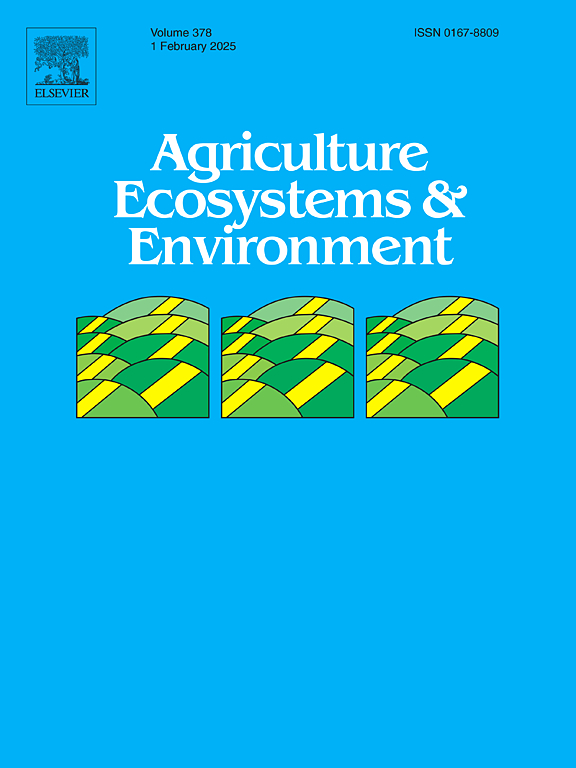Doing more with less: Strategic agricultural land retirement during drought improves environmental and social outcomes
IF 6
1区 农林科学
Q1 AGRICULTURE, MULTIDISCIPLINARY
引用次数: 0
Abstract
Agricultural land retirement is an increasingly common phenomena in irrigated agricultural systems where limited surface water availability has resulted in overdrafted groundwater basins, idled farmland, and major policy changes. Yet, the environmental and economic impacts of agricultural land retirement depend, in part, on the extent, spatial distribution and former crop type of retired lands. Here we evaluate the potential environmental, economic and social opportunities and tradeoffs embedded in land retirement decisions. Using the 2011–2015 extended drought in Kern County, California as an example, we evaluate different retirement scenarios for costs (based on foregone, crop-specific revenue), water savings, habitat for biodiversity, farmworker jobs and landscape connectivity relative to what was actually idled. Our results illustrate that the water savings and habitat protection for biodiversity resulting from the realized fallowing in 2015 could have been achieved with less than ⅙ of the cost. Alternatively, optimizing land retirement for water savings or habitat at the same cost as in 2015 could have tripled the amount of water saved or habitat created. More strategically retiring lands improved social and ecological outcomes, though tradeoffs among objectives often remained. This study illustrates the large benefits potentially attainable through landscape-level planning among landowners and the influence of policy goals on ecological and social outcomes.
少花钱多办事:干旱期间战略性退耕可改善环境和社会成果
在灌溉农业系统中,农田退耕是一种日益普遍的现象,有限的地表水供应导致地下水流域透支、农田闲置和重大政策变化。然而,农田退耕对环境和经济的影响部分取决于退耕土地的范围、空间分布和以前的作物类型。在此,我们对土地退耕决策中潜在的环境、经济和社会机遇及权衡进行了评估。以加利福尼亚州克恩县 2011-2015 年的长期干旱为例,我们评估了不同退耕方案的成本(基于放弃的特定作物收入)、节水、生物多样性栖息地、农民工就业和景观连通性与实际闲置情况的关系。我们的结果表明,2015 年实现的休耕所带来的节水和生物多样性栖息地保护本可以用少于⅙的成本来实现。或者,在成本与 2015 年相同的情况下,优化土地退耕以节约用水或保护栖息地,可以使节约用水或保护栖息地的数量增加两倍。更具战略性的土地退耕改善了社会和生态成果,尽管各目标之间往往仍存在权衡。这项研究说明,通过土地所有者之间的景观规划以及政策目标对生态和社会结果的影响,可能会产生巨大的效益。
本文章由计算机程序翻译,如有差异,请以英文原文为准。
求助全文
约1分钟内获得全文
求助全文
来源期刊

Agriculture, Ecosystems & Environment
环境科学-环境科学
CiteScore
11.70
自引率
9.10%
发文量
392
审稿时长
26 days
期刊介绍:
Agriculture, Ecosystems and Environment publishes scientific articles dealing with the interface between agroecosystems and the natural environment, specifically how agriculture influences the environment and how changes in that environment impact agroecosystems. Preference is given to papers from experimental and observational research at the field, system or landscape level, from studies that enhance our understanding of processes using data-based biophysical modelling, and papers that bridge scientific disciplines and integrate knowledge. All papers should be placed in an international or wide comparative context.
 求助内容:
求助内容: 应助结果提醒方式:
应助结果提醒方式:


